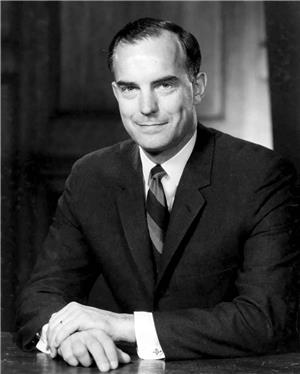On July 24, 1969, Washington Governor Daniel J. Evans (1925-2024) appoints African American Marvin E. Glass to the Board of Trustees of Seattle Community College after a series of protests, some violent, over community college discriminatory policies including the lack of African American representation on the board. Six civil rights organizations support the appointment, but the more radical Black Student Union (BSU) and Black United Front object.
The appointment came following boycotts, demonstrations, and finally rioting to protest disparities in funding and academic focus between the College's central campus, located near a significant number of black residents, and the north and south campuses, located in predominantly white neighborhoods. The protests included the objection to the lack of African American representation on the board. Out of $33 million in capital funds for the three campuses, the central campus, located on Capitol Hill near the Central Area, was slated to receive only $2 million.
Protests began on February 26, 1969, with a peaceful five-hour sit-in at the offices of SCC president Dr. Ed K. Erickson by members of the Black Student Union (BSU). The students objected to most SCC capital funds being directed to the north and south campuses and to the assignment of "the most menial of vocational offerings" to the central campus. The state legislature reacted to the sit-in by limiting expenditures on the central campus (the only such limitation imposed on any community college in the state). The Black Student Union and the college negotiated changes to a campus advisory group, but final authority over any change in curriculum had to come from the board of trustees. The Black Student Union demanded that all five trustees resign and that the governor appoint only BSU-approved replacements.
Violence erupted at the Seattle Community College's central campus on May 26, 1969, when a demonstration by the Black Students Union (BSU) and the Students for a Democratic Society (SDS) escalated into a riot that swept to Garfield High School. Nine police officers were injured, three by gunshots, and 30 persons were arrested. Later that day, one member of the board resigned and the BSU "appointed" its own replacement, David Mills.
Governor Evans was flooded with mail from around the state urging him not to give in to the BSU demands. He nominated first one, then another African American to the board, but both declined. Glass, a Pacific Northwest Bell engineer and supervisor, was Evans's third nominee and he accepted. Glass stated, "I'll probably receive pressure, but I'm not easily coerced."
The NAACP, the Seattle Urban League, the Central Area Civil Rights Committee, and three other civil rights organizations supported Glass's appointment, but Black United Front president David Mills called Glass "a white Negro." BSU president A. Frank Williams said, "The struggle has not ended with the appointment, the struggle has just begun."
In 1971, Glass was elected president of the SCC Board of Trustees.

